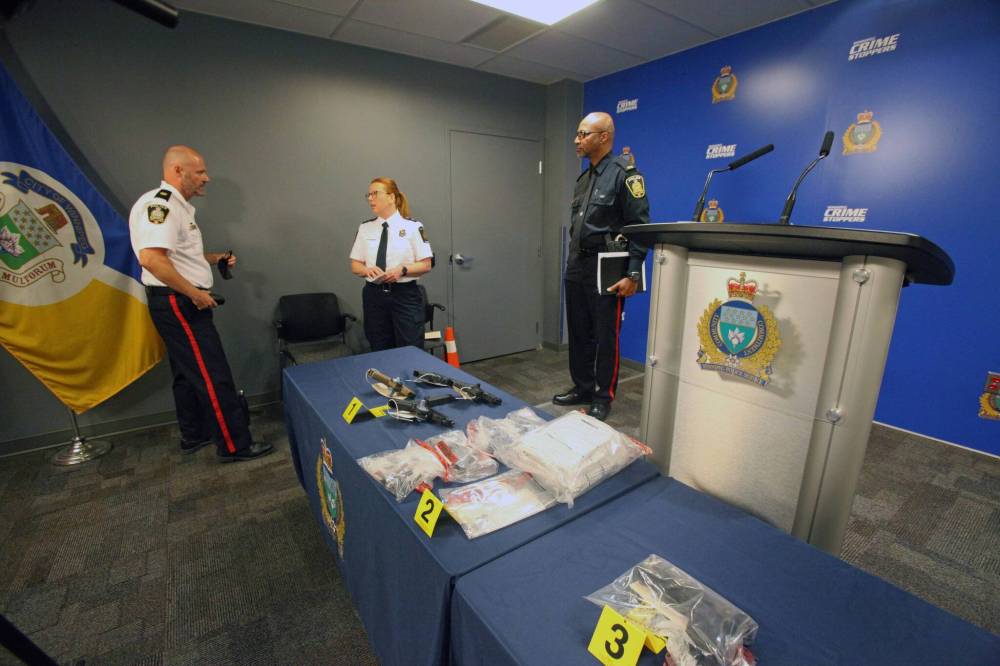Winnipeg man faces 3D-printed gun charges
Advertisement
Read this article for free:
or
Already have an account? Log in here »
To continue reading, please subscribe:
Monthly Digital Subscription
$1 per week for 24 weeks*
- Enjoy unlimited reading on winnipegfreepress.com
- Read the E-Edition, our digital replica newspaper
- Access News Break, our award-winning app
- Play interactive puzzles
*Billed as $4.00 plus GST every four weeks. After 24 weeks, price increases to the regular rate of $19.00 plus GST every four weeks. Offer available to new and qualified returning subscribers only. Cancel any time.
Monthly Digital Subscription
$4.75/week*
- Enjoy unlimited reading on winnipegfreepress.com
- Read the E-Edition, our digital replica newspaper
- Access News Break, our award-winning app
- Play interactive puzzles
*Billed as $19 plus GST every four weeks. Cancel any time.
To continue reading, please subscribe:
Add Free Press access to your Brandon Sun subscription for only an additional
$1 for the first 4 weeks*
*Your next subscription payment will increase by $1.00 and you will be charged $16.99 plus GST for four weeks. After four weeks, your payment will increase to $23.99 plus GST every four weeks.
Read unlimited articles for free today:
or
Already have an account? Log in here »
Hey there, time traveller!
This article was published 14/07/2022 (1190 days ago), so information in it may no longer be current.
Winnipeg police have arrested a 24-year-old man accused of assembling and trafficking 3D-printed handguns, after a lengthy investigation involving multiple law enforcement agencies.
Plastic-body guns are an increasing problem on city streets, Winnipeg Police Service organized crime unit Insp. Elton Hall told reporters at a news conference Thursday.
Last year, local police seized “seven or eight” 3D-printed guns; this year, that number’s been surpassed, he said.

Of the 11 homicides committed with a firearm thus far in 2022, two or three involved a 3D-printed gun, Hall added.
The file was opened in November, when Canada Border Services Agency called Winnipeg Police Service firearms investigators to let them know it had seized gun parts at an international mail facility in Mississauga, Ont., destined for Manitoba’s capital.
Investigators believed those parts were to be built into 3D-printed guns.
In April, the accused tried to purchase firearms parts in Calgary using a disguised identity, spokesman Const. Claude Chancy said. Later that month, the accused successfully bought parts in Montreal, also while using a disguised identity, Chancy said.
Hall said it meant using someone else’s identity, possibly with their knowledge, to purchase the parts.
Between April and May, police allege, the accused took those parts and assembled a gun, then sold it to another person. Police executed a warrant on a home in Winnipeg and seized the gun.
On June 25, city police and CBSA executed a warrant on a home on the 100 block of Prevette Avenue, seizing various 3D-printed gun parts and ammunition.
It included three 3D-printed handgun receivers (which are prohibited), nine-millimetre ammunition, handgun slide parts, a rear frame rail kit, trigger assembly, an automatic sear (prohibited) and electronic equipment seized by border services.
Blake Ellison-Crate, 24, of Winnipeg, has been charged with five counts of weapons manufacturing and trafficking, two counts each of identity theft, identity fraud and possession contrary to an order, as well as possession of a prohibited device knowing it is unauthorized.
He was also charged under the Customs Act with participating in or consenting to making false statements.
Hall said the accused is part of a larger firearm trafficking network, but would not reveal further details.
Calgary, Vancouver and Moose Jaw police assisted in the probe, as did national weapons enforcement support team members from the Manitoba RCMP and in Montreal.
Investigators did not find evidence to prove Ellison-Crate was printing guns himself — rather, they allege he was assembling them from parts.
Apart from receivers, those parts aren’t prohibited to purchase, Hall said, and aren’t addressed in proposed federal legislation to further limit the purchase, sale, importation and transfer of handguns.
“Without any sort of legal oversight related to the buying, selling and movement of these gun parts, it will be very difficult for police agencies to prevent the manufacturing of 3D-printed guns, and thus, difficult to combat gun violence in Canadian cities,” he said.
erik.pindera@freepress.mb.ca
Twitter: @erik_pindera

Erik Pindera is a reporter for the Free Press, mostly focusing on crime and justice. The born-and-bred Winnipegger attended Red River College Polytechnic, wrote for the community newspaper in Kenora, Ont. and reported on television and radio in Winnipeg before joining the Free Press in 2020. Read more about Erik.
Every piece of reporting Erik produces is reviewed by an editing team before it is posted online or published in print — part of the Free Press‘s tradition, since 1872, of producing reliable independent journalism. Read more about Free Press’s history and mandate, and learn how our newsroom operates.
Our newsroom depends on a growing audience of readers to power our journalism. If you are not a paid reader, please consider becoming a subscriber.
Our newsroom depends on its audience of readers to power our journalism. Thank you for your support.



